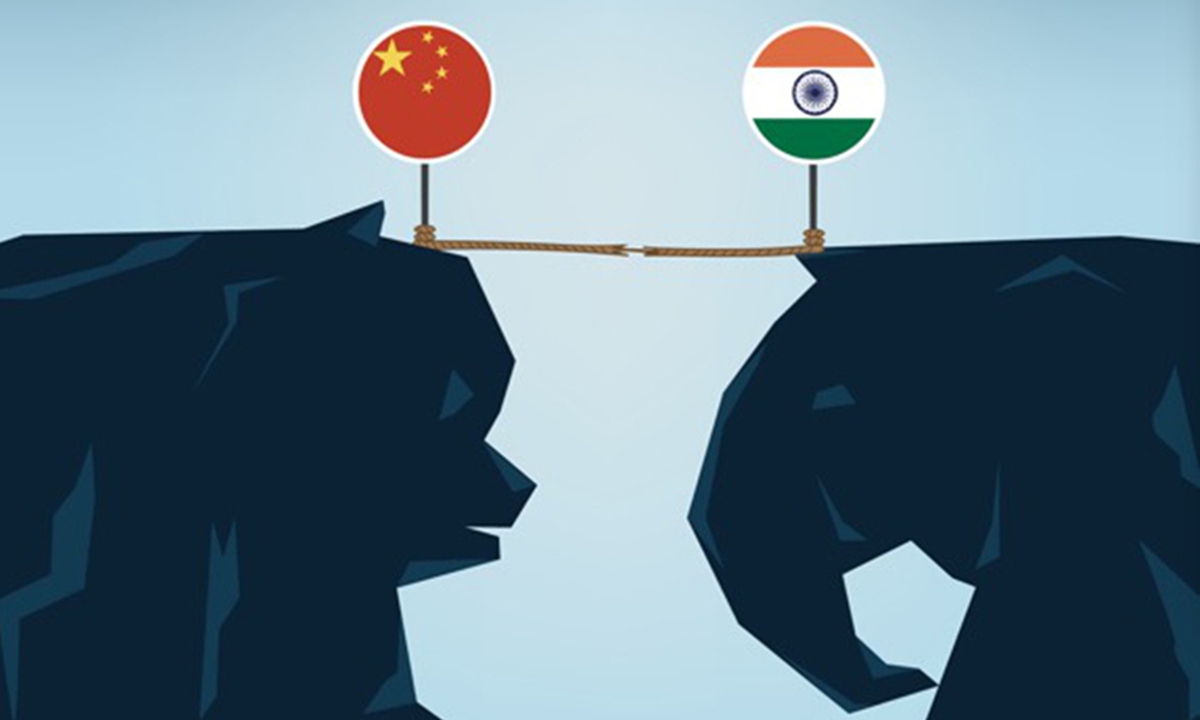India’s hard-line attempt to politicize Confucius Institutes will backfire
Source: Global Times Published: 2020/8/4 20:03:41

Illustration: GT
Editor's Note:
According to a report by the Hindustan Times on Sunday, India's education ministry has decided to review in the coming week Confucius Institutes and "Confucius classrooms" in association with seven local colleges and universities. This course of actions comes after security agencies alerted it to the growing Chinese influence in higher education in India. How to interpret India's move? How will it influence educational and cultural exchanges between China and India? Two Chinese scholars shared their views with the Global Times.
Qian Feng, director of the research department at the National Strategy Institute at Tsinghua University
India intends to display toughness against China by deciding to review Chinese language programs across universities. Since the Galwan Valley clash, India has taken a string of hard-line actions against China, including reviewing investment proposals from Chinese firms, blocking China-linked apps and restricting Chinese companies from participating in public procurement bids. India has upped the ante against China by targeting the Confucius Institutes. This indicates that the Indian show of toughness toward China is far from coming to an end.
India cited security concerns to review Chinese language programs. The excuse is totally untenable. From the US' crackdown on Chinese enterprises such as Huawei and TikTok, one can see that "security threats" have become a disguise that is too often used for improper purposes.
China-India relations have been affected by the international environment as well as the China-US relations. Now the US is launching an all-round crackdown on China, including imposing restrictions on people-to-people exchanges. Many of India's moves against China are consistent with the US' suppression on China. It's an obvious tendency that India is moving closer to the US strategically.
India has been caught up in a nationalist fever since the Galwan Valley clash. Confronted with domestic political pressure and rising anti-China sentiment, the Indian government has to show a hard-line stance toward China. India's decision to review the Confucius Institutes is in fact an act to politicize education and people-to-people exchanges. It will negatively affect the mutual trust between the Chinese and Indian societies as well as the political trust between the two governments.
China is India's largest neighbor and China has played a relatively big role in India's economic development over the past decades. Politicizing economic, education and people-to-people exchanges with China will bring nothing but harm to India.
Some anti-China forces in India are clamoring to decouple the Indian economy from China's. Reviewing education cooperation programs is equivalent to seeking cultural decoupling. It's an ever worsening trend.
There have been ups and downs in bilateral relations since China and India established diplomatic relations 70 years ago. The two countries had previously undergone chilly ties and confrontations like what they are experiencing now. But each time when bilateral relationships reached a low point, they rebounded. This is decided by the national interests of the two countries. China and India are immovable neighbors.
As two representatives of emerging powers, China and India have a lot of room for cooperation. This determines that the two will finally go back to the track of mending ties. Whether relations can turn around now largely depends on whether India can take a rational attitude toward China. I suggest India not go too far in getting tough on China, as it will surely backfire.
Wang Dehua, director of the Institute of South Asia and Central Asia Studies, Shanghai Municipal Center for International Studies
Some Indians wrongly see the Confucius Institutes as China's propaganda machines that export China's ideology. It is not surprising to witness their over-sensitivity. China-India relations are quite strained now and it's mainly because India has failed to correctly evaluate the situation. Like a cattle that is hard to pull back, India is moving closer to the US, and it intends to show the US its hard-line posture against China. The number of the Confucius Institutes in India is limited. If New Delhi reviews these institutes, it will bring great uncertainties to whether the operations of these institutes could continue.
Since the border clash between China and India broke out, India has taken a series of hard-line measures against China. I believe the 1962 defeat hangover has persisted in India. Some of the Indian elites believe China is expansionist. They regard China's good relationship with India's neighboring countries, especially Pakistan, as a big threat. Some Indian elites suppose if the border issue cannot be settled now, it will be much more difficult to tackle in 30 years. Therefore, they have repeatedly provoked China over the border issue now.
Posted in: ASIAN REVIEW,CHINA-INDIA